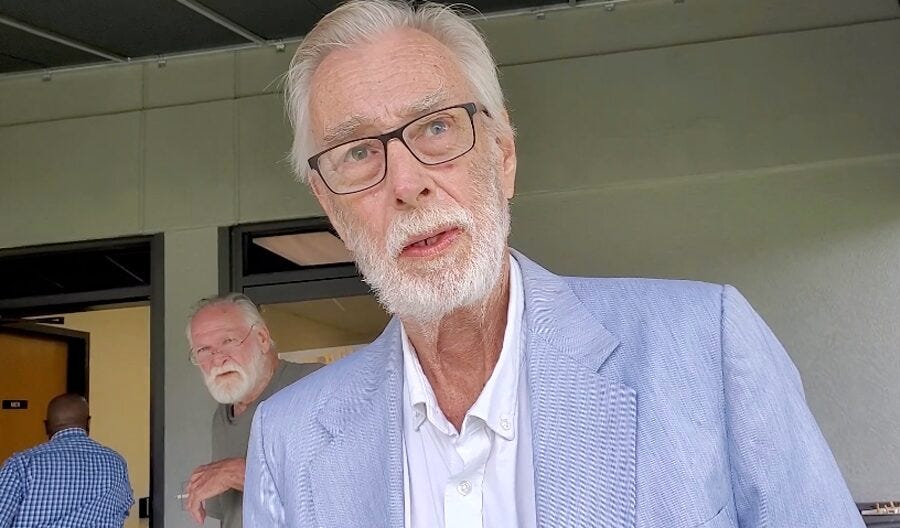Judge skips out, ‘sends’ bogus traffic case to jury trial – Part II
Accused knows more law than Fort Oglethorpe, Ga., judge Webb in case showing how small-town fleecing operations protect their own, namely a shifty officer



FORT OGLETHORPE, Ga., Thursday, Aug. 14, 2024 — The controversy between truck driver Michael James and Fort Oglethorpe city judge Winston Webb is that the judge refuses to consider basic due process principles espoused by the accused in a “no seatbelt violation” case.
Michael James insists Patrick Clements, the city solicitor, has not made any defense against his challenge against what he declares is a case voided by perjury from city cop Shandi Hall.
Mr. James comes to Fort Oglethorpe, fearing the worst. He has ready a petition for writ of habeas corpus in case the judge, hostile and unreasonable, opts to find him in contempt and to throw him into the Catoosa County jail.
The James case stands out over thousands of other cases in the shakdown of the public known as “traffic enforcement” because Mr. James is studying the rules of procedure and intends to not be a slave, as were some of his ancestors prior to the war against the states in 1861.
The judge opens the hearing by saying he entered a not guilty plea for Mr. James at an earlier hearing.
“Your honor. I don’t think the court can plead for me. I never did plea. I challenge the jurisdiction of the solicitor, because the seatbelt in the state of Georgia is a state law. The solicitor handles misdemeanors. It is not a misdemeanor crime. It’s a nonmoving violation. The solicitor handles only misdemeanor crimes, where there is a harm and an injury. So, there’s no proof of an injured person, there’s no breach of the peace, so there’s no case here, your honor. I challenged Mr. Clements on March 14, 2024, and they haven’t proven jurisdiction.
“Once jurisdiction is not proven on the record, the court has to ministerially dismiss the case.”
TAKEAWAYS
— If the state doesn’t establish subject matter jurisdiction, the case is void
— City may, or may not, have authority to prosecute traffic cases, depending on whether state law is adopted as ordinance
— Resisting evil makes the enemy give ground, as Judge Webb does in this case
— Even $15 fine worth fighting if defense is correct, and we’re done being oppressed
“There’s not a harmed person, there’s not an injured person. There is no case or the solicitor to prosecute. I’m asking again that the court dismiss the case ministerially. I’m not looking to harm Miss Officer Hall. My beef is with Henry County” and creation of a false arrest warrant unsworn. “Henry County caused all this mess. The trucking company caused all this mess. I already have the EEOC finding in my favor against the trucking company. I’m just trying to stay clear” with his truck driver license, the CDL.
“I respectfully object, your honor.”
The judge says he wants Mr. James to “waive your right to a jury trial.” That’s a trap. It would give him subject matter jurisdiction, Mr. James says later.
Mr. James doesn’t bite.
The judge presses again that he waive right to jury trial
Steadfast, Mr. James refuses, saying he is not pleading either guilty or not guilty. He is challenging jurisdiction, which means the case fails to empower the court to reach any of the seatbelt allegations’ merits. The judge cites only geographical jurisdiction, not enough of itself to enter into the merits.
Mr. James insists on having in personam jurisdiction. He effectively denies the possibility of a case so corrupt it lacks justiciable substance and is void, or voidable.
Mr. James’ case “can’t just sit there in limbo from here to eternity,” Judge Webb says, he he indicates he must act decisively.
“But judge, you can’t enter a plea for me because that’s against the rules judicial. You have to be neutral and impartial.”
“I can’t be neutral and impartial if you don’t make a plea,” Judge Webb insists.
“I’m telling you, they haven’t proven jurisdiction, your honor.”
Mr. Clements the solicitor says he moves the case he transferred to the state court of Catoosa County “as provided by law.”
“We aren’t making any headway here, so I remand it to state court,” Judge Webb agrees.
Because traffic court is essnentially lawless, the judge acts in terms of “making headway” which dodges the foundational legal demands from Mr. James. His “sending the case” to state court is not a legal conception, but a personal one. Where law is ignored, oficials act on feelings and sociology.
Mr. James lodges his objection again to continuation of the case and the judge proffers him a form to sign indicating what is happening today. “I’m objecting it, so I can’t sign for it,” he says.


From Jon Luman —
What I witnessed there on Thursday afternoon was more "Deprivation of rights, under color of Law".
As personnel of a Municipal corporation did all that they could to coerce a man to waive his Lawful Rights as one of the People of Georgia, and therefore yield jurisdiction/Authority with regard to him, to a corporation, that has not acquired it lawfully.
The corporation, and it's employees have been properly and lawfully challenged to prove authority/jurisdiction with regard to Michael James, a man. On the record, as required by Law.
I witnessed, and listened intently for the determination and finding that the pleadings of the plaintiff were sufficient to establish jurisdiction/authority with regard to Michael James, a man, but there was no such finding of such fact, in spite of Michael James proper and Lawful challenge.
It appears that the judge is only "so-called", having not acquired Lawful authority/jurisdiction with regard to Michael James, a man, and this case, which does not yet exist without such proof of authority/jurisdiction.
Lacking such evidence, this case is wholly VOID of Law, and by Law.
It is a principle of law that, once challenged, the person asserting
jurisdiction must prove that jurisdiction to exist as a matter of law.
“A void judgment is one which, from its inception, was a complete nullity and without legal effect” Lubben v. Selective Service System Local Bd. No. 27, 453 F.2d 645, 14 A.L.R. Fed. 298 (C.A. 1 Mass. 1972). Hobbs v. U.S. Office of Personnel Management, 485 F.Supp. 456 (M.D. Fla. 1980).
“Void judgment is one which has no legal force or effect whatever, it is an absolute nullity, its invalidity may be asserted by any person whose rights are affected at any time and at any place and it need not be attacked directly but may be attacked collaterally whenever and wherever it is interposed.” City of Lufkin v. McVicker, 510 S.W. 2d 141 (Tex. Civ. App. – Beaumont 1973).
“A void judgment, insofar as it purports to be pronouncement of court, is an absolute nullity” Thompson v. Thompson, 238 S.W.2d 218 (Tex.Civ.App. – Waco 1951).
“Void order may be attacked, either directly or collaterally, at any time” In re Estate of Steinfield, 630 N.E.2d 801, certiorari denied, See also Steinfeld v. Hoddick, 513 U.S. 809, (Ill. 1994).
“A void judgment is one which, from its inception, is and forever continues to be absolutely null, without legal efficacy, ineffectual to bind the parties or to support a right, of no legal force and effect whatever, and incapable of enforcement in any manner or to any degree.” Loyd v. Director, Dept. of Public Safety, 480 So. 2d 577 (Ala. Civ. App. 1985).